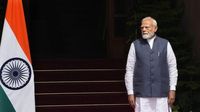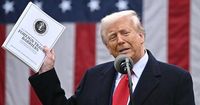In a bold declaration reminiscent of a medical triumph, President Donald Trump likened himself to a doctor performing surgery in a recent post on his Truth Social platform. This proclamation came in the wake of his controversial "Liberation Day" announcement, which introduced a sweeping 10% tariff on foreign goods, further escalating tensions in the ongoing trade war with major partners like China and the European Union. Trump enthusiastically proclaimed, "THE OPERATION IS OVER! THE PATIENT LIVED, AND IS HEALING. THE PROGNOSIS IS THAT THE PATIENT WILL BE FAR STRONGER, BIGGER, BETTER, AND MORE RESILIENT THAN EVER BEFORE. MAKE AMERICA GREAT AGAIN!!!" However, if this healing includes the plummeting global markets following his tariff announcement, one might wonder just how effective this operation really was.
Critics of Trump's strategy have emerged from both sides of the aisle, with one investment firm CEO labeling the tariffs a "disaster of idiocy." This sentiment was echoed by various conservative politicians who voiced their concerns about the potential fallout from such aggressive trade measures. As markets reacted to the news, it became clear that Trump might need to reconsider his approach. The stock market saw a significant downturn, with reports indicating a drop of 20% following his announcement.
On April 4, 2025, Trump appeared to further complicate matters by seemingly admitting in a video that he was "purposely crashing the stock market." The video, which he shared without comment, claimed that his actions were part of a strategy to push more cash into the treasury. The narrator of the clip suggested that by tanking the stock market, Trump was attempting to force the Federal Reserve to slash interest rates in May, allowing the government to refinance trillions of dollars of debt at a lower cost.
Despite the dire assessments from economists, the video branded Trump's tariff strategy as a "genius play." It argued that the tariffs would compel companies to manufacture more goods domestically and encourage farmers to sell their products within the U.S., ultimately driving prices down. However, many economists are skeptical of this analysis, warning that such tariffs could spark inflation and potentially trigger a recession.
In a swift response to Trump's tariffs, China announced a retaliatory 34% tariff on all U.S.-imported goods, effective April 10, 2025. This move was part of a broader strategy to counter what they deemed unilateral bullying by the U.S. government. The Chinese Ministry of Finance released a statement condemning the U.S. tariffs as inconsistent with international trade rules and detrimental to China's legitimate rights and interests. The statement read, "This practice of the US is not in line with international trade rules, seriously undermines China's legitimate rights and interests, and is a typical unilateral bullying practice."
The implications of these tariffs have already been felt on global markets. Following the announcement, the FTSE 100 in London plunged by 3.8% at the start of trading, while Italy's FTSE MIB dropped over 7% and Spain's IBEX 35 fell by more than 5.5%. The commodities market also took a hit, with Brent Crude Oil falling to a four-year low of $65.42 per barrel.
Economists are increasingly concerned about the potential long-term consequences of Trump's trade policies. They warn that the tariffs, which act as a tax on businesses, will likely trickle down to consumers, leading to higher prices and reduced spending. Given that consumer expenditures account for approximately 70% of U.S. economic activity, any decrease in spending could stall economic growth or even lead to a recession.
Olu Sonola, head of U.S. Economic Research at Fitch Ratings, remarked on the gravity of the situation, stating, "This is a game changer, not only for the U.S. economy but for the global economy. Many countries will likely end up in a recession." This stark warning underscores the interconnectedness of global markets and the potential ripple effects of U.S. trade policies.
As the trade war escalates, the stakes are higher than ever. Trump's administration faces mounting pressure from both political allies and opponents to reconsider the aggressive tariff measures. With markets reacting negatively and economists forecasting dire economic consequences, the path forward remains uncertain. Will Trump continue to double down on his strategy, or will he heed the warnings from experts and adjust course?
For now, the world watches closely as the implications of these tariffs unfold. The coming weeks will be crucial in determining not just the fate of the U.S. economy, but also the broader global economic landscape. As Trump continues to assert his vision for America, the reality of market reactions and economic forecasts may force him to adapt his approach to avoid further turmoil.






